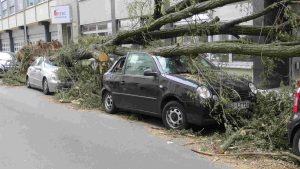Save the Day: File Your Insurance Claim AND Keep Premiums Low
In today’s superhero movies, we see a lot of our friendly neighborhood heroes accidentally damaging property, and soon we’ll see them on NBC creating insurance headaches in their quest to defeat evil villains. Thor’s hammer shatters a window; Superman flies into one car and tosses another; and the Hulk levels entire apartment complexes. Saving the city […]

December 2, 2016
 In today’s superhero movies, we see a lot of our friendly neighborhood heroes accidentally damaging property, and soon we’ll see them on NBC creating insurance headaches in their quest to defeat evil villains. Thor’s hammer shatters a window; Superman flies into one car and tosses another; and the Hulk levels entire apartment complexes. Saving the city tends to result in a lot of property damage.
In today’s superhero movies, we see a lot of our friendly neighborhood heroes accidentally damaging property, and soon we’ll see them on NBC creating insurance headaches in their quest to defeat evil villains. Thor’s hammer shatters a window; Superman flies into one car and tosses another; and the Hulk levels entire apartment complexes. Saving the city tends to result in a lot of property damage.
These scenarios are made-up, of course, but so is the misconception that you have to call an insurance adjuster immediately after an accident. You do not. If you or any passengers in your vehicle have been injured to any degree, it is far better to wait to call an insurance adjuster until after those injuries have been assessed and treated and after you’ve spoken to your personal injury attorney.
There is no law in any state that requires you as an injured person to give a recorded statement to an insurance company, to either your own insurer or to that of the other driver.
It’s important to wait to settle an insurance claim until your treatment has been completed so you can receive compensation for all of your injuries, not just the ones that presented signs immediately. But while you’re assessing your own injuries, you’re probably wondering: Has this accident damaged my car insurance rate?
Blaming Superman: Comparative Fault
 Let’s say Superman hits your car in one of his quests to save the city. You’re not injured and neither is the bulletproof Man of Steel, but your car is pretty badly damaged. Naturally, your first worry is that your car insurance rates will skyrocket.
Let’s say Superman hits your car in one of his quests to save the city. You’re not injured and neither is the bulletproof Man of Steel, but your car is pretty badly damaged. Naturally, your first worry is that your car insurance rates will skyrocket.
But your insurance company considers many factors before deciding to adjust your rate, not just whether or not you’ve been in an accident. Esurance lists five factors that will determine whether a claim will increase your car insurance rate:
- The severity of the incident (and therefore the size of the claim)
- Your driving history (decades of safe driving will not cause a company to consider you a high risk due to one accident)
- Who’s to blame (if you were not driving recklessly or while impaired, and the other driver is found to be to blame, you’re less likely to see your rates rise)
- Your policy’s details (does your policy include “accident forgiveness” for small claims?)
- Whether you live in a comparative fault state
The fifth factor may work in your favor. Indiana is a “fault state” in which the Comparative Fault Act applies. After an accident in a “fault state,” each side’s insurance company tries to show that their insured person was less responsible for the accident and that the other drive was more responsible.
In a no-fault state, your insurance company is almost guaranteed to have to pay some portion of the claim, no matter who is to blame. That would make it more likely that your insurance rates would go up after a claim. Since you’re in the “fault state” of Indiana, your insurance company would only need to pay out on claims if you, as their policyholder, were found to be at fault.
Keeping Your Insurance Rate Low
CBS News reported on a study about insurance rate increases after accidents. The study was based on a hypothetical driver profile:

- 45-year-old female
- Married
- Regular job
- Excellent credit score
- Never a lapse in coverage
- No prior insurance claims
Researchers then looked at three different “what-if” claims this person might file:
- Bodily injury
- Property damage
- Comprehensive (damage to a car caused not by an accident, but by hail, flooding, or theft)
The study found that if the hypothetical accident had not been the fault of the insured, there would have been no increase in premium.
If it had been the fault of the insured, a single claim of $2,000 or more would have generated a premium increase of 41%. (The average U.S. auto insurance premium of $815 a year would increase by $355.) For two claims filed in one year, the increase would jump to 93%. The one bright spot in researchers’ findings: the premium increases don’t tend to be permanent. Increases typically last for only three to five years and then start to drop to pre-claim levels.
So, in our hypothetical scenario, Superman would clearly be at fault and your premiums would stay low. (If you could get Superman’s insurance company to resolve your damages.)
Comprehensive Claims
 But what about that third category of claims in the study, “comprehensive claims”? An example of a comprehensive claim might be if your car is damaged by debris that falls from the car in front of you on the freeway. The flying debris scenario might play out in different ways:
But what about that third category of claims in the study, “comprehensive claims”? An example of a comprehensive claim might be if your car is damaged by debris that falls from the car in front of you on the freeway. The flying debris scenario might play out in different ways:
- The debris causes damage to your hood and windshield and the insurer judges it to be a flying missile covered under your comprehensive coverage. It’s not likely your rates will rise, according to NASDAQ.
- You didn’t avoid the debris, but instead ran over it. That would fall under your collision coverage and would be considered a “chargeable accident,” possibly causing a rise in your rate.
- The car ahead of you stopped and took responsibility for the flying debris, and your claim went through their property damage liability coverage. Your rates would probably remain unaffected.
Two factors can make your insurer see you as a higher risk – even if you’re not at fault:
- You’re involved in more than one accident
- You live in a “high risk” area
So why file a claim at all? It may be your only option if:
- You don’t want to spend the money to cover your losses
- The other party doesn’t have insurance (or not enough to cover your losses)
The belief that any claim, no matter its size, under any circumstances, will lead to an increased car insurance rate is as fictional as Superman. However, it’s a good idea to discuss with your own insurance agent how filing a claim is likely to affect your premiums.
All Superhero names and symbols are trademarks™ or registered® trademarks of their respective holders. Use of them does not imply any affiliation with or endorsement by them.